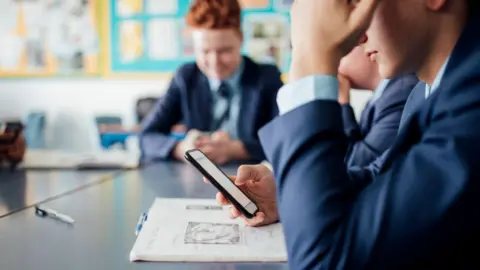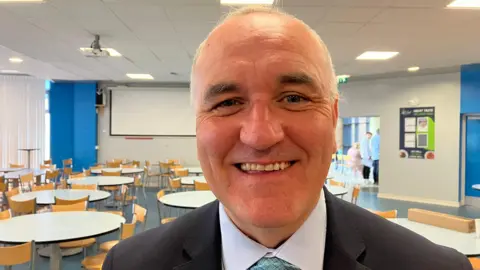 Getty Images
Getty ImagesSchools in Northern Ireland are being advised to restrict pupils from using mobile phones during the school day.
Education Minister Paul Givan issued new guidance on Tuesday, which also applies to limiting use at break and lunchtimes.
He said there was growing evidence that phones “distract children from learning”.
The restrictions “can have a positive impact on academic achievement and engagement”, he added.
Not legally binding
 Getty Images/SolStock
Getty Images/SolStockMr Givan also said the guidance will allow teachers “to do what they do best – teach”.
In a statement, his department acknowledged many schools already have mobile phone policies in place.
The new guidance is to ensure a more consistent approach, it continued.
In many cases, pupils can bring a phone to school, but they must not be visible during the school day.
That means pupils cannot take them out during classes unless they are part of a lesson, or use them at break or lunchtimes.
In some cases, if a pupil is caught using a phone, it is confiscated, and the pupil can collect it at the end of the school day.
“Many countries across the world are increasingly taking steps to stop phone use at school,” Mr Givan outlined.
“The new guidance will ensure schools in Northern Ireland are fully aware of the latest evidence and have practical advice around different approaches to restricting phone use.”
The guidance is being accompanied by a pilot of phone-free solutions, the department announced, to prevent pupils using phones during the school day.
This includes inviting expressions of interest from schools to use pocket-sized pouches which phones will be placed in.
These will be closed using a magnetic latch.
“Changes around phone use in schools can make the world of difference in our classrooms,” Minister Givan said.
“Restricting their use during the school day allows children to better concentrate, engage and learn, as well as enjoying ‘phone-free’ break and lunchtimes so they can play, have fun, participate in sports and socialise with their friends.”

At Londonderry’s Lisneal College there are already strict rules on pupil’s use of mobile phones.
Pupils hand their phones to their form teacher in the morning, getting it back at the end of the day.
Principal Michael Allen told BBC News NI’s Good Morning Ulster the rules encouraged learning and kept pupils safe from online harm while at school.
“If you can imagine sitting in a classroom with a mobile phone in your pocket, even if that phone is never out, and that mobile phone buzzes, rings, chimes…
“No matter how focused you are as a student, whether you decide to take that phone out and look which some pupils may do, or even if you don’t, you spend the next two or three minutes thinking ‘who was that? I wonder who wants me?’.
That scenario, he said, could play out more than 30 times per day for each pupil.
‘A very balanced approach’
Lauren is a pupil at Dalriada School in Ballymoney and is president of the Secondary Students’ Union NI.
She told the programme she understands that finding a balance “can be very difficult to do”.
At her school pupils do have access to their phones.
“You can check your phone occasionally but not during class times, not when the teacher is talking,” she said.
“I find that when I go home and obviously have unlimited access to my phone and those notifications are coming through constantly.
“In school we have always had that very balanced approach that has allowed me to understand that when I go home I should develop the same strategy and the same approach.”
 Liam McBurney/PA Wire
Liam McBurney/PA WireThe governments in England and the Republic of Ireland have recently advised schools to ban phones during the day.
In the Republic of Ireland, the Education Minister Norma Foley said she wanted to establish a “culture of non-acceptance of the mobile phone” in schools.
MPs in England have previously said the government should consider proposals to ban smartphones for under-16s.
Unesco, the UN’s education and science body, has also previously advised that smartphones should be banned from schools to tackle classroom disruption and improve learning.
“Even just having a mobile phone nearby with notifications coming through is enough to result in students losing their attention from the task at hand,” Unesco said.
The previous guidance to schools on mobile devices from the Department of Education (DE) in Northern Ireland was eight years old.
It mainly focused on the possible educational uses of mobile phones.

